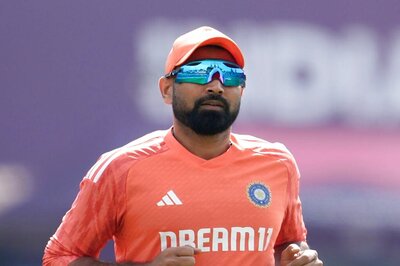
views
The online gaming world today is innovating faster than expected and evolving into a large number of variants which is great news for gaming enthusiasts. However, regulators, law enforcement agencies, and courts have to equally keep pace to understand and make informed decisions around the legitimacy of such evolving forms of online games and sports. Today, the online gaming world has multiple forms ranging from Online Fantasy Sports (OFS), e-Sports, Online Skill-based Casual Games & Sports that include but not limited to online versions of Carrom, Chess, Billiards, Ludo, Scrabble, Sudoku to even multiple types of quiz. Added to this further are multiple online versions of card-based games.
Today, when we evaluate one of the fastest growing forms amongst these, it is the Online Fantasy Sports (OFS). Interestingly, OFS is completely unique since it is based on real-life sports events that are officially sanctioned by the government or other recognised sports bodies. In OFS the creation of virtual teams is completely a knowledge and skill-based activity that leaves very little to chance. Knowledge and application of the same around players, team strength, location, turf and so on can only be possible for a keen follower of the game. The result of a fantasy sports contest is only dependent on the actual performance of the selected sportspersons in their real-world sports matches and not on any particular outcome. Hence, the distinction is quite clear that Fantasy Sports are based only on real-life sports and do not involve simulation of any kind. So, if in the real world there are no games or matches taking place there is zero possibility of OFS happening, which is why during lockdown OFS companies suffered as there was no real-world sporting activity.
The format of Online Fantasy Sports ensures that sports enthusiasts follow the matches more keenly and this directly results in increased focus and attention towards sports. Fantasy Sports users watch and follow sports far more diligently. All of this and much more makes fantasy sports distinct from all other forms of online games and is consumed as a sports engagement platform by avid sports fans. The majority of time spent by a fantasy sports user is on sports research, analysis and following the underlying real-world match. This makes it more a knowledge-based and non-screen-addictive form of engagement, as has already been explained in detail in the whitepaper released last year by IndiaTech.org before the run-up to the IPL.
This sector despite having to its credit multiple court rulings in its favour and widely recognised as a game of skill continues to be unfortunately under a shadow of doubt amongst few states in the country. The sector has been battling various perception challenges with State Governments some of whom have a blanket ban on any form of online gaming including fantasy sports. There are other states who have taken cognisance of the distinction between a game of skill from that of a game of chance but there is yet a generic perception that oftentimes paints this sector with the same colour as that of gambling and/or betting.
In addition, NITI Aayog had clearly laid out in its report that fantasy sports are clearly a sports engagement tool different from all other online formats. NITI Aayog in its report had proposed a light-touch self-regulatory framework that also provided an impetus for further innovation. It is now important that this initiative of NITI Aayog that laid down the Eight Guiding principles moves quicker towards recognition and adoption by helping set up a self-regulatory organisation, along with the uniform national-level guidelines that can be prescribed so that the emerging industry is safeguarded along with sports enthusiasts and act as a deterrence against unscrupulous operators. The Ministry of Electronics and Information technology in the case of OTT has already shown the way for self-regulation being recognised as a mechanism for collaborative regulatory oversight that is in line with the government’s Maximum Governance, the Minimum Government model.
A collaborative and recognised self-regulatory model would ensure this sunrise industry which has already given us unicorns in a very short span of time can with the right amount of legitimacy and regulatory clarity help it grow significantly. Online Fantasy Sports has in recent years witnessed a great deal of attention both from sports fans and investors which has positioned it on a rather strong footing to grow continually and take on to global markets as well.
Rameesh Kailasam is CEO & president at IndiaTech.org. He is a public policy expert contributing to solving a range of policy and regulatory challenges faced by the internet-based ecosystem especially start-ups.
Read all the Latest News, Breaking News and Coronavirus News here. Follow us on Facebook, Twitter and Telegram.




















Comments
0 comment